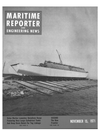
Page 12: of Maritime Reporter Magazine (November 15, 1971)
Read this page in Pdf, Flash or Html5 edition of November 15, 1971 Maritime Reporter Magazine
The New Frontier— (Continued from page 12)
Oceanic and Atmospheric Admin- istration was an important interim step in the formulation of a Na- tional Oceans Policy by the Fed- eral Government. Ultimately, NO-
AA should become an independent agency, reporting directly to the
President.
NOAA will allocate Federal pri- orities and responsibilities and, as a result of centralizing efforts in this area, it should effectively eliminate the duplication of effort and fund- ing that previously existed in Fed- eral programs. A coordinated effort in national oceanography programs would also provide new initiative and efficiency in decision-mak- ing capabilities of the Executive
Branch of Government. NOAA will provide high-level spokesmen with- in the Federal Government for ocean affairs, and should serve as a focal point and forum for indus- try-Government relations in this field.
Each year NOAA should provide the President, the Congess, and the general public with an annual report detailing its facilities, gen- eral capabilities, activities of its various agencies, its relationship with other oceanographic projects, and its future plans for a long- range, comprehensive national pro- gram in the marine sciences.
Industry's Role
While the primary responsibility for commercially developing ocean resources clearly resides in the in- dustrial area, a basic responsibility for developing scientific, economic and military uses of the sea should be shared by industry, Government, and by private groups. In this re- gard, the Federal Government does and should function as a major in- vestor in oceanographic research and development, utilizing the ex- perience and expertise that indus- try is capable of providing.
It has been the initiatives, invest- ments and efforts of the private sector which have developed the capacity of the nation to gather and use the food, mineral and other re- sources of the oceans and make them available to the people.
The primary responsibility for developing these ocean resources should continue to reside in the in- dustrial area. Proliferation of Gov- ernment programs and expanding
Government expenditures in this area should not be encouraged.
While the actual development of marine resources will continue to be actively pursued by the private sector, the Federal Government should adopt policies to facilitate and encourage these efforts.
In pursuit of this aim, an im- portant step would be the creation of a National Advisory Committee for the Oceans and Atmosphere (NACOA). Functioning as a co- ordinating agency between Govern- ment and the private sector, the Na- tional Advisory Committee should be composed of individuals from outside the Federal Government, broadly representative of the indus- trial community, the states, the sci- entific community and other inter- ested groups. NACOA should be independent of related Government agencies such as the Department of Commerce and the National
Oceanic and Atmospheric Admin- istration.
Regarding operating procedures, this Committee should annually report directly to the President, and should provide the President,
Congress and the general public with an annual report describing the status of and progress made by private and governmental pro- grams in ocean areas, and provide continuing guidance for a national ocean resources development pro- gram.
Research efforts relating to na- tional defense, forecasts of weather and climate conditions, and the gathering and dissemination of basic information concerning the oceans are responsibilities of the
Federal Government.
Less than one-fifth of the ocean bottom has been surveyed and mapped in detail, and maps relat- ing to scientific, economic and na- tional defense uses of the seas are often inadequate. To alleviate this problem, the Federal Government should extend and intensify its reconnaissance of the Continental
Shelves and the ocean bottom, pro- ducing accurate maps of biological and mineral resources, as well as de- tailed maps of bathymetric charac- teristics of the ocean environment.
Federal agencies originating many of these basic projects involving general surveys and the gathering of basic information and engineer- ing data should contract these pro- jects to the private sector when- ever practical or possible.
An essential part of any far- sighted oceans policy must be the protection of the ocean environ- ment and sea life from harmful pol- lution. The President has called for regulation of ocean dumping.
Many of our coastal cities have used the ocean to dispose of solid wastes and sludge from sewage treatment plants. The abyss has been used to deposit potentially harmful substances such as radio- active and toxic compounds. The possibility of widespread damage to the delicate balance of life in the seas indicates that appropriate reg- ulations to minimize pollution of waters in which operations are be- ing conducted and to minimize oth- er harm to the environment are necessarv and desirable, and indus- try has pledged full cooperation to- ward that end.
Living Resources
The United States' fishing fleets have declined to embarrassing' pro- portions. The Bureau of Commerci- al Fisheries estimates that the U.S.
Coastal Zones could produce six to seven times more fish and shellfish than its current annual production, yet U.S. fishermen harvest only one-t^nth of this potential.
While the world fishery produc- tion has mark^dlv increased over the years, the United States catch for 1968 was less than 1965 figures, with the United States currently running sixth in world figures be- hind Peru, Japan, the Soviet Union,
Mainland China, and Norway. 'Since 1956, the United States has dropped from second to sixth among the fishing nations of the world.
Despite the fact that the United
States is one of the world's major consumers of fish, poor manage- ment, outdated equipment, and antiquated harvesting techniques explain why less than 40 percent of the total U.S. fish consumption is provided by domestic fishermen, although U.S. consumption of fish has actually tripled during the last 20 years.
In 1966, the average age of a
U.S. fish vessel was 20 years, and the average age of a West Coast halibut vessel was 36 years. It is obvious that the equipment, tech- niques, and fishing methods used by our fishing fleet are as outdated as the ships they sail.
The United States should adopt a progressive national fisheries pol- icy which will advance the harvest- ing and utilization of the living re- sources of the sea.
Such a policy should mitigate jurisdictional differences among the several states and the Federal
Government and should embrace and foster those international trea- ties and commissions dealing with conservation of resources and the law of the seas.
Complicated and often contradic- tory sets of local, state and Federal laws and regulations—originally designed to conserve species and reduce conflicts among the various users of the seas and waterways— have evolved into cumbersome and outdated regulations that inhibit fishing efficiency and shamefully limit the use of new technologies and capabilities. Inadequate in- formation about fish distribution and behavior contribute to the problems faced iby the fishing in- dustry today. The Federal Govern- ment clearly needs to re-examine and eliminate fishing regulations that restrict efficiency and encour- age irrational practices.
Looking Ahead
In the years past, men spoke of the sea in terms of ballads, sea chanteys and prose. Today, we live in a more practical age. The poets, singers and dreamers of yesterday have been replaced by the scientists and engineers of today. As the world's population and standard of living increase, we realize that man's future existence on this planet will require his effective use of the seas and products they pro- duce. Even though we are more practical today, it may not be too romantic to visualize undersea hab- itats for people mining in the seabeds; offshore nuclear power plants; and a national aqua-culture program which will result in the harvesting of a vast amount of food substances. There is every indica- tion that the uses of marine trans- portation and fisheries could ex- pand substantially. The sea can be used to a greater extent to sustain life, and almost undoubtedly must be used for this purpose. To use these resources, we must preserve the ecology of the oceans.
In this process, we should not jeopardize the national security and well-being of the citizens of the
United States. For example, new offshore oil and gas reserves are urgently needed to help the United
States meet an energy demand which will double in the next 15 years to meet the national defense, employment, and recreation needs of our citizens. Unfortunately, we do not have the luxury of deciding which source of energy we would like to use. The United States is rapidly approaching an era in which all available energy sources must be used. Just to meet forecast de- mand over the next 15 years, it will be necessary to find almost 50jbil- lion barrels of oil, which is about 40 percent as much oil as has been discovered in the United States in its entire history.
The development of offshore areas is clearly in the national in- terest. How to develop these na- tural resources in a manner con- sistent with local interest should be the real question. It is Ameri- can industry's objective to operate in a responsible manner consistent with the concept of multiple use of the seas—a concept which rec- ognizes that the benefits offered by the seas, whether food, recreation, transportation or energy, can be utilized by all, through a system of orderly and cooperative develop- ment.
Our country should assert its ex- clusive jurisdiction over mineral resources off its shores down to the junction of the submerged portion of the continent with the abyssal ocean floor. The current proposal to internationalize ocean areas be- yond a depth of 200 meters should be strongly opposed. The proposed treaty to accomplish this should be carefully re-examined and an amended position should be resub- mitted by the Federal Government which would be more favorable to the security and well-being of the people of the United States.
Although we have learned more about the seas in the past 10 years than we have in the past 20 cen- turies, the process of unwrapping this great gift that has been given to mankind has just begun.
The technology for recovering these resources is in the embryonic stage or nonexistent. If we are to open the vaults of the ocean for the benefit of our own and other nations, then a great deal of hard work lies ahead. We should not un- derestimate the difficulties to be overcome before we can apply the living and nonliving resources of the ocean to the needs of men.
Industry believes that this nation should create a climate that en- courages private enterprise to ven- ture its skills and capital in de- veloping these ocean resources.
To achieve this goal, we must develop a coordinated and rational national program in the marine sciences and the development of marine natural resources. 14 Maritime Reporter/Engineering News

 11
11

 13
13
